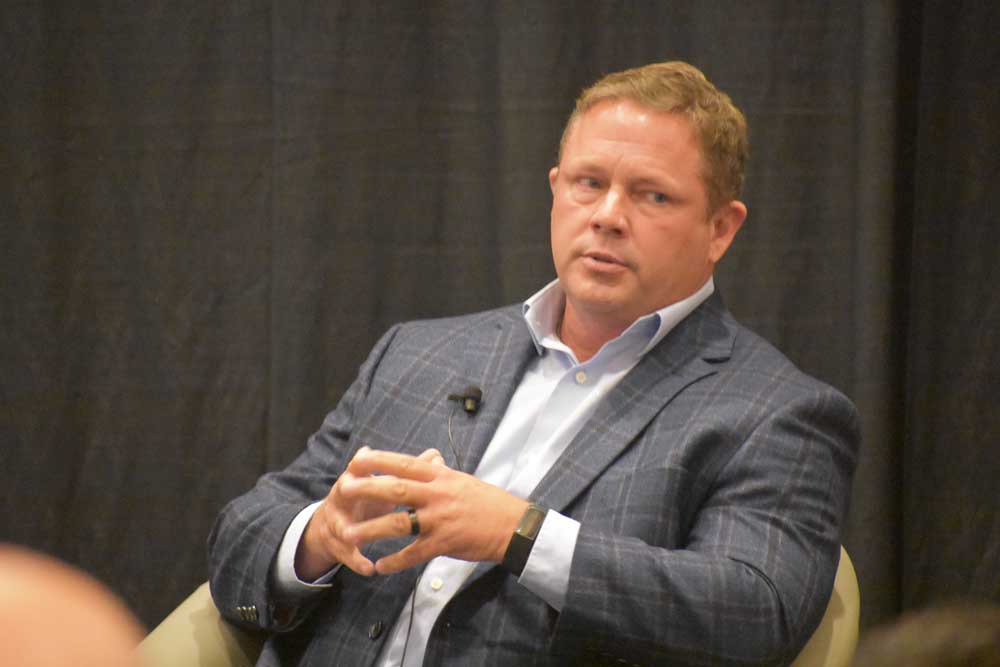Whitfield County school board approves career, technical and agricultural education grants
Published 11:00 am Friday, September 13, 2024

- David Moeller, who is Whitfield County Schools’ director of career, technical and agricultural education, speaks with Whitfield County Board of Education members about program updates and recently approved grants.
Members of the Whitfield County Board of Education unanimously approved several grant awards this week, including three grants from the Georgia Department of Education for the system’s career, technical and agricultural education (CTAE) program.
The grants include $151,330 in federal Perkins V funds, a $154,443 CTAE grant and $75,168 in agricultural education grants.
Trending
According to the Georgia Department of Education, the “primary” use of Perkins V funds is to “develop, coordinate, implement or improve career and technical education programs to meet the needs identified in (a) comprehensive needs assessment.” Perkins V funds cannot be used to maintain career education programs.
During a school board meeting, Northwest Georgia College & Career Academy CEO and Whitfield County Schools’ CTAE Director David Moeller said, “To accept the Perkins grant, one of the things that we have to do is go through a needs assessment. Every spring, I go through a needs assessment and look at our community, and every two years we do a complete re-write, and the latest re-write was last year.”
‘Overarching needs’Moeller said working with partners in industry, kindergarten through grade 12 education and postsecondary education, system officials decided on several “overarching needs” for the CTAE program.
One involves evaluating “employability skills” through all grade levels, he said.
“I like to call employability skills the new learning gap,” Moeller said. “Students need these skills. We are able to graduate kids that can do math, read and write, but it’s about showing up on time, being self-regulated and self-disciplined to be able to do the things they need to do.”
Moeller said he finds those skills to be the “most important” because of their transferability.
Trending
“I tell people all the time, there are kids right now in middle school that are probably going to have a job that doesn’t exist yet,” he said. “So how do we prepare them for those skills and what they’re going to need? Employability skills are going to take them all the way through to whatever they need to do.”
Moeller also outlined intervention support for students.
“That’s just making sure that our students who need support (in regular classes) are also getting that support in CTAE classes,” he said. “Not just the academic side.”
Moeller said one of the larger needs that will “probably require the bulk of grant expenditures” is CTAE equipment and technology.
“CTAE involves a lot of technology and a lot of equipment, and our labs have to be updated (frequently),” he said. “So a lot of our funds will go towards that need. Then there’s the credentials of value, and that revolves around testing … and the crosswalk of standards for our teachers, so that what they’re teaching in the labs and in the classrooms is also going to be crosswalks that they understand is going to be on the tests, and that they follow that blueprint.”
Moeller said the system does not have to use Perkins funds for all the “overarching needs.”
“Most of it is probably going to be used for focus on the employability skills, support for our teachers and the equipment and technology,” he said.
By the numbersAccording to the latest certified data provided by Whitfield County Schools regarding CTAE enrollment, 2,157 middle school students and 3,307 high school students are enrolled in CTAE courses.
“That means 78% of all high school students take at least one CTAE course and 72% of our middle school students take at least one CTAE course,” Moeller said. “So we’re doing a lot of good work. Our graduation rate for Whitfield County Schools is over 97% for a (student with a CTAE concentration).”
Moeller said the system offers 29 high school CTAE pathways and 16 of the state’s 17 career clusters, which include career paths in agriculture, construction, audio/video technology, management, finance, healthcare, manufacturing and law enforcement.
“We’re only missing the energy cluster, which we do not have a pathway for,” he said. “For (fiscal year 2023), which is the latest state data, we had 482 graduated pathway completions. Currently, we have 13 active CTSO (Career and Technical Student Organization) chapters. That includes (organizations) like FFA (Future Farmers of America) and things along those lines.”
Currently, 983 students are members of a CTSO in Whitfield County Schools, Moeller said.
“And we have 372 students in Work-Based Learning,” Moeller said. “That program continues to grow, and our coordinators do a great job working with our industry partners and those students and families.”
The Work-Based Learning program allows high school students to work in an industry or environment associated with their career pathway during school for credit hours.
Putting students on the right career pathMoeller said several pathways are available to students at the three high schools — Northwest Whitfield, Southeast Whitfield and Coahulla Creek — including business and technology, which focuses on Microsoft skills such as Excel, Powerpoint and Word, and agriculture and nutrition and food science.
Another pathway is teaching as a profession, Moeller said.
“The good thing about teaching as a profession is we actually have students going through all of our elementary schools and middle schools,” he said. “Most (student teaching) practicums are done at elementary schools, but our teachers felt that our students needed to get experience at all levels. So our students will rotate through elementary and middle, and then they’ll do a little bit of work at their home high schools.”
Moeller said many pathways are available at the College & Career Academy, including automotive, which provides graduates with their Automotive Service Excellence certification.
“That program also has a brand new electric vehicle lab set up right across the hall from the (regular automotive lab), so now there are two available,” he said.
College & Career Academy students can also pursue pathways in culinary arts, healthcare, information technology, law enforcement, manufacturing and mechatronics (which combines electronics with mechanical and electrical engineering), with certifications available in each.
Moeller said students can enroll in the academy’s First Responders and Fire Academy, which includes pathways in corrections services, law enforcement/forensic science and three fire and emergency services pathways in which students can train in firefighting or as an emergency medical responder or emergency medical technician (EMT).
“We can graduate a high school student with Fire Fighter 1, Fire Fighter 2, HazMat (hazardous materials) and EMT (certifications),” he said. “We’ve got 17 students right now at (Georgia Northwestern Technical College’s Whitfield Murray Campus) in the EMT program, and most of them are going to come in the spring and start the fire pathway as well.”
Moeller said several of the most recent Whitfield County Fire Department hires have come from the First Responders and Fire Academy.
“It’s been a great thing for our students,” he said.
Superintendent Mike Ewton said the CTAE offerings for students is “impressive.”
“We feel like all of our students need to be college- and career-ready, whatever that looks like,” Ewton said. “Not everybody’s going to college, but they need to be able to if they want to. So whether they enlist, enroll or go straight into employment, I think (the CTAE program) is appropriate. and you guys are doing a phenomenal job in helping them get there.”
Moeller said the CTAE team strives to help students decide on the right career path.
“It’s really like a highway with several offerings,” he said. “If a kid wants to go straight to the workforce, we’ll have them prepared. If they want to get a two-year degree with a technical certificate, we’ll have them prepared. and if they want to get that four-year degree, they’re ready to do that as well.”





